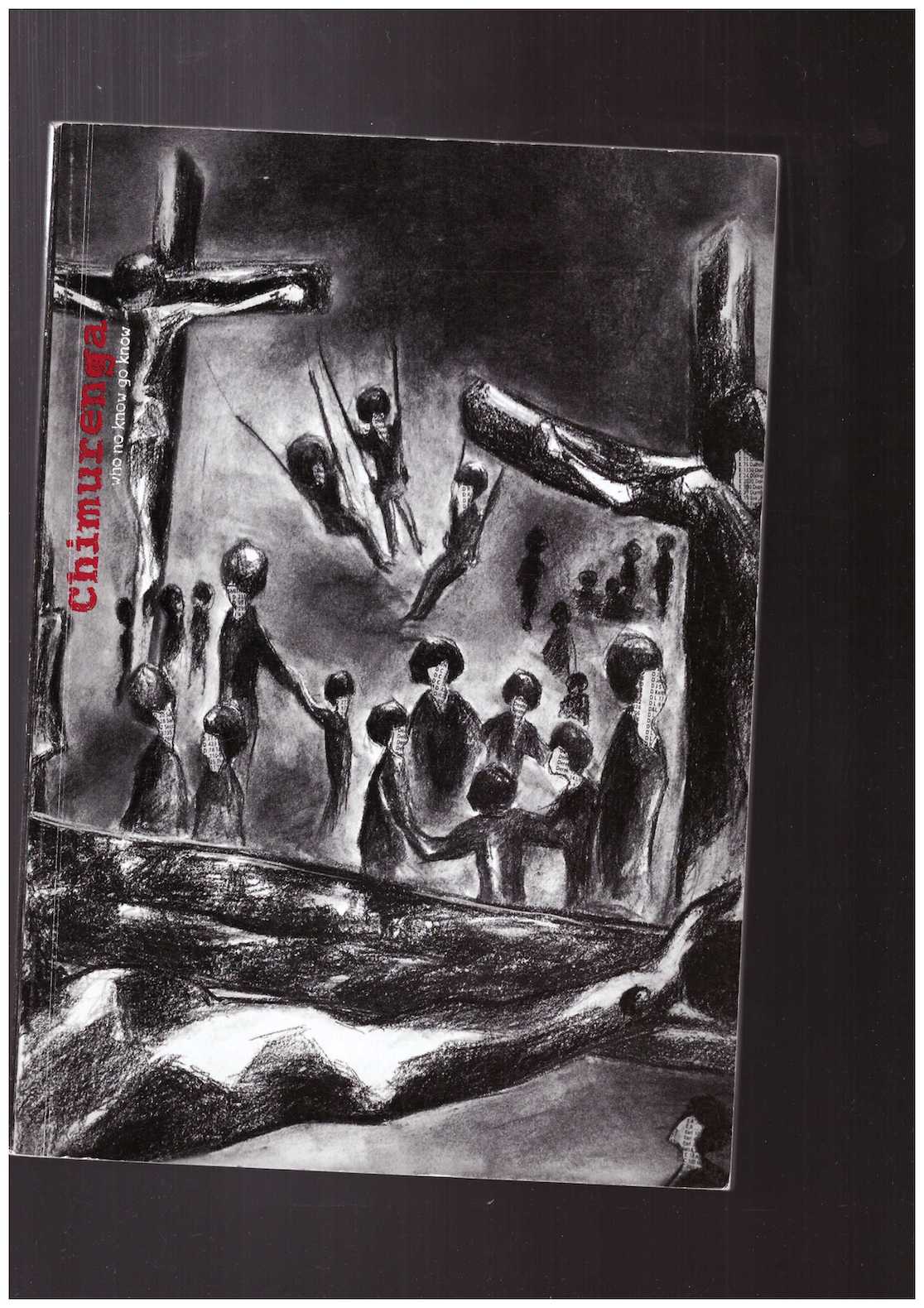CHIMURENGA (ed.)
Chimurenga #09 (Conversations in Luanda and Other Graphic Stories)
For this one we trawled the globe for pen and ink artists/wordists to give us their perspectives on love, life and the multiverse. What you get is an issue of Chimurenga Comics with a thematic coherence in its insistence on art as interrogator and creator.
Chimurenga #9 is bracketed by treatises on truth and Thelonious Monk. And in between, you have graphic takes on miscegenation, philosophy, re-incarnation, polygamy, infinity…
Sandra Brewster’s cover depicts a playground crucifixion scene that in its simplicity of composition and uniformity of characters (faces as telephone directories) denotes the horror of human action that assumes neither responsibility, nor guilt. The first of many takes on GODness to follow.
Cape Town’s Graeme Arendse aka Ramgee delivers a stark distillation of the semiotics of the SA Truth and Reconciliation Commission’s amnesty hearings into the murder of BC vocaliser and visionary, Steve Biko: how a discourse of deceit flows seamlessly into a visage of amorality. Ramgee also collaborates with novelist Jose Eduardo Agualusa and filmmaker Karen Boswall on a graphic travelogue (Luanda to Maputo, via Cape Town) based on a narrative for the film My Father’s Wives, in development by Agualusa and Boswall.
A first for English readers, an excerpt from a biography on Ernesto Che Guevara, shows the scene of his death in 1967 at the hands of Bolivian soldiers and American intelligence and paramilitary agencies. First published in Buenos Aires in 1968, this early graphic book (dense strokes, extremities of light and shadow) sold 60 000 in its first week. In the 70s, it became as dangerous as the man himself. Copies were burned or buried alive. The book’s scriptwriter, Hector Oesterheld and his 3 daughters were murdered by the military junta. The artists, Alberto Breccia and his son, Enrique, were also put on the junta’s hitlist.
The black unicorn was mistaken / For a shadow or symbol / And taken through a cold country / Where my mist painted mockeries / Of my fury / It is not on her lap / Where the horn rests / But deep in her moonpit growing / The black unicorn is restless / The black unicorn is unrelenting / The black unicorn is not / Free – These words taken from Audre Lorde’s poem, The Black Unicorn, are woven into rhetorical charcoal drawings by Sandra Brewster, inspired by the conversation between Fela Anikulapo Kuti and Keziah Jones (printed in Chimurenga #8).
Jean-Michel Basquiat, another warrior in the art battle between words and pictures, is remembered through a verse from his rap comic, “Pegasus”. Says hip hop aristocrat, Fab 5 Freddy: “If you read this canvas out loud to yourself, the repetition, the rhythm, you can hear Jean-Michel thinking. You can see that this is a poetic, rhythmic type of blending of word with image.”
Martin Tom Dieck (art) and Jens Blazer (words) propel a surreal trip into philosophy, staging an afterlife conversation between deconstructionist Gilles Deleuze, arch semiotician Roland Barthes, big dada of psychoanalysis Jacques Lacan and the dude who brought us discourse, Michel Foucault. In French, nogal.
In “Miscegenation of Life,” based on the 1959 Hollywood film An Imitation of Life (on interracial love), Lance Tooks takes his biting parody into the heart of whiteness, satirizing the western preoccupation with racial purity. Tooks provocatively samples his polarized images of black and white stereotypes from the works of acclaimed cartoonists (Crumb, Eisner, Lauzier and others) and reconstitutes them to draw his own critical conclusions. In his 2nd piece in this issue, “The Student (Or Nude Descending a Staircase…Head First)”, Tooks aka Junior Samples provides a derisory and hyperbolic look at the machinations and bargains in the art world.
With the exception of the subtle menacing colour shading of “Godhead” by Ho Che Anderson, all the artwork is B&W. “Godhead” is drawn from Anderson’s novel-in-progress by the same title, a class struggle drama and theological discussion wrapped in the skin of an action adventure story. “God is Dead So Smile” by Nikhil Singh, is a dystopic rendition of a machine megalomaniac society where neither morality nor spiritualism has a place. And there’s Stripshow co-founder and editor Nicolene Louw, who traces a delicate circle of the relationship between three generations of females in “Ladies”; Orijit Sen, with an oblique look at theories of the afterlife in “Visioncarnation”; “Difficulties,” an Afrodelik piece by Mac Mcgill; Yvan Alagbe and Olivier Dramanti imagine a conversation between Behanzin (last ruler of Dahomey) and King Sebastian (Portugual), both in exile; Jeroen Jansen illustrating Rwandan proverbs in an animalistic and orgiastic style, in “Buhoro Buhoro Ni Rwo Rugendo” (Slowly, slowly: that’s the right course), while Andrzej Nowicki is in “Haiti”; and finally, “Small Hands”, Danijel Zezelj’s haunting tribute to Thelonious Monk. [publishers’ note]
Published by Chimurenga, 2006
Periodicals / Literature / Politics
